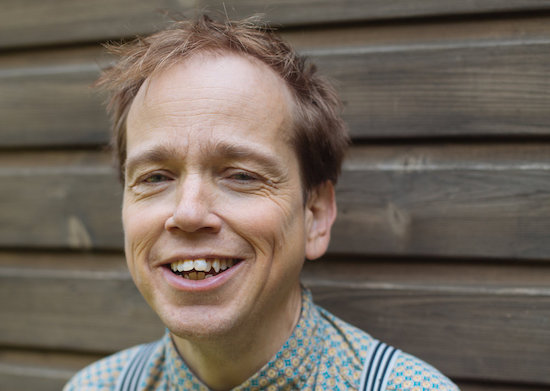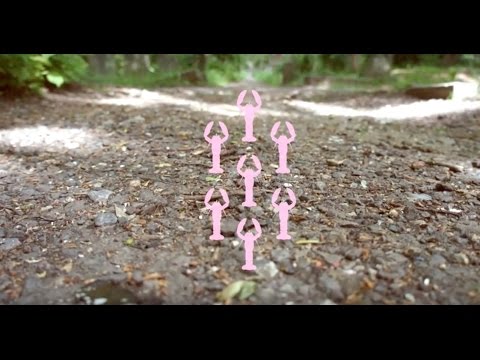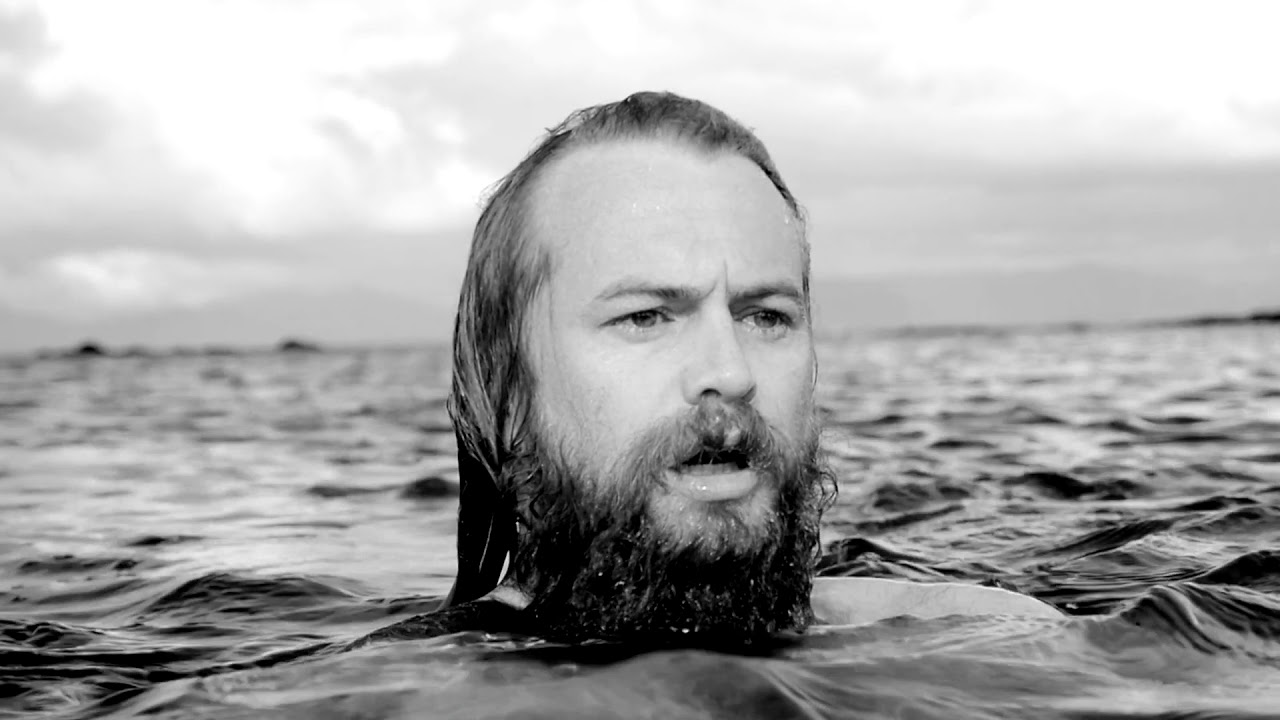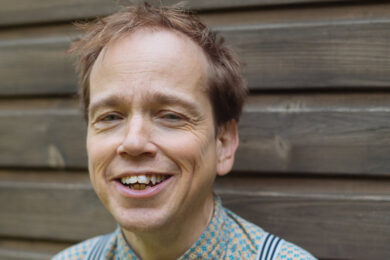I meet Ed Dowie outside of a unit on an industrial estate in North-East London. The small space is a hive-like studio complex with tiny cell-like rooms which wouldn’t seem out of place inside a Wes Anderson animation. Dowie’s studio contains a piano, his laptop, some speakers, spools of multicoloured cables, and and a tall fan which is trying its hardest to breath some cool air into the stuffy room. The revelation that Ed’s songs find their origins within such a spatially limited setting seems entirely fitting when you consider his fascination for stretching time and space – “I love the way those concepts don’t have any reality really."
Dowie’s first band, Brothers In Sound, were signed to cult-label Regal Recordings in 1998 and released a single album, Family Is For Sharing, in 2000. The band ceased making music after its release, and Dowie went to university to study experimental music. Following a string of EPs the songwriter broke his extended period of silence by releasing his debut album, The Uncle Sold, on Lost Map Records last year; the album received praise for its experimentalism and gentle beauty, and Dowie was labelled a "starry-eyed visionary" by this site.
To quote Walter Benjamin’s Unpacking My Library, "Every passion borders on the chaotic, but the collector’s passion borders on the chaos of memories." What is your earliest memory?
Ed Dowie: I remember that I’d have these dreams when I was little that I could never describe, and whenever I tried to describe them in words it would be all wrong. There were these people that were planets and there was a really steep, narrow staircase, and there were lots of people going up and down it, and then they would reach the top, and there would be this infinite plane of nothing.
The Uncle Sold was released last year and took its inspiration from the 1995 novel, The Unconsoled by Kazuo Ishiguro. I wondered why you chose it.
ED: Because, in a way, it’s the most incredible thing I’ve ever read. You know when you begin reading a new book, you have a little daydream where you wonder where the book will go. Well, in the book, this character arrives at a hotel, and gets into a lift, and begins to have a conversation with the hotel porter. I thought, wouldn’t it be brilliant to read something that just keeps going in that lift, much longer than is possible? Then it sort of does just that, and that’s the whole book really. I love the way that time and space doesn’t have any reality, or it does and then it changes. Have you read it?
I have, and I’m glad you spoke about the lift, as that was what struck me straight away about the novel – it warps the sense of time.
ED: I think it’s really the only book i’ve ever read where I really didn’t want it to end. I felt like I could have just kept reading, for ever in a way.
Walter Benjamin’s essay Unpacking My Library was the inspiration behind your first EP. In an interview you said in regards to the essay, “something about it seemed to reflect my situation and approach”. I wondered if you could expand on that a little?
ED: Part of it was a practical response. A friend of mine has this small publishing company called Paravion Press, and they take texts which are out of copyright and make nice editions of them. They did one of the Walter Benjamin essay and launched it at a bookshop in Berlin. He asked me to play a gig at the launch, which forced me to write something – and that was the origin of the EP. But I also felt that there was something in Benjamin’s descriptions of ‘collecting’ stuff, which I felt like I had been doing for 20 years, and therefore this opportunity was a catalyst to say, “right, it’s time to stop collecting”.
Brothers In Sound were originally signed to Regal Recordings alongside The Beta Band back in the late 90s. What are some of your fondest memories of the time?
ED: It was brilliant. Especially looking back, when I was 19, to walk into the EMI offices and see the gold discs on the wall – it’s the stuff of dreams as a teenager when you start making music. As a band we spoke about writing music for a while, and then we made an album in four days, sent it to record labels, and then they got back and said they’d like to release it. It was sort of insane – I think that experience sort of spoiled me a bit. I had this idea that making the music was all you had to do. Then for years and years and years I just didn’t make anything, because in my head I thought, “When I do, it’ll be fine.”
What was touring like back then?
ED: We didn’t actually tour that much. And we started off just making recorded music, so it was quite a while after we released the album that we actually started to try and work out how to play it live. Trying to work out the on-stage technology with MIDI leads everywhere – our first gig in Brighton, everything that could have possibly gone wrong went wrong, but it was brilliant. Stuff going suddenly 200 BPM for a bar, or randomly adding a bar, everything changing. It was fantastic.
I’ve been trying to find links between your solo material and your work in Brothers In Sound, and I feel as if they both flirt with the experimental and even the esoteric. Why do you think you are drawn to these less conventional sounds and formats?
ED: Well, I think partly – I think that most music is awful. And that is only my opinion, I’m not saying that I don’t think music is worth not making, but I don’t like most music. The idea of making something which is boring is the most awful thought. And there is just so much room for experimentation, this is what really excites me about music. Between the forefront of avant-garde, experimental music and pop music there is such a brilliant and amazing gap to be explored – it’s like a playground of opportunity. I think it’s just fun, and you always have to have that sense of fun when you make stuff.
The connection made me wonder which experimental or electronic artists were you into when you were studying for your degree in experimental music?
ED: We did a lot about minimalists, it was a really interesting course to do and I thought that starting with the minimalists was a really brilliant way of doing it. Minimalism is a great introduction to experimental music, because it’s very pop in a way – it’s very recognisable, there is melody and the idea of taking that somewhere. So, people like Steve Reich, Philip Glass and La Monte Young were definitely a springboard to other artists. And then, Xenakis and others – when someone is doing something which is so different to what you know you can’t help but be excited about how they got there and how they did it. Also, Terry Riley’s ‘In C’, we performed that piece in an ensemble, and that was really fun. It was really nice to discover acousmatic stuff, and that’s when I realised where Leafcutter John fits in with that sort of thing. I remember somebody playing me The Housebound Spirit before I went to uni, and at that point it was the most out there thing I had ever heard. I definitely made a decision before I went to uni that I didn’t want to made any judgements for three years, I would just take everything on board, there would be plenty of time afterwards to make decisions about whether something is good, and that was on everything – what we were taught, or how we were taught. This way I could listen to anything, and believe that there was value in what I was listening to.
John Doran nostalgically recalled a memory he holds of a night spent in a chalet with MDMA and a bath full of naked people soaking in washing up liquid. Were you there on this night?
ED: [LAUGHS] Yeah, yeah.
Is it a story you would mind telling?
ED: It was the first ATP (All Tomorrow’s Parties) night I went to. I think John was DJ’ing, and we had decided to build a fort out of pillows in the front room as it seemed like the best thing to do. So every time I went to ATP we made a fort. They were always curated by one person these ATP events, which is what made them so interesting. But it was held at Butlins, so it was this really weird merge of worlds that wouldn’t usually collide. You’d be standing watching a Japanese drone band playing at however many decibels, and on the same stage the weekend before might have been a Pink cover band. Basically, we all sat in this fort, this little cocoon, feeling all loved up, and John was DJing on his phone.
Could you tell me a bit more about your relationship with Total Refreshment Centre?
ED: It’s probably through Alabaster dePlume that I know Total Refreshment Centre and he does a thing there every month.The first one I went to was called Peach after his first album, so it was an album launch. Then he decided to have the same event every month. ATP used to put on nights in the downstairs space, which was usually quite heavy electronic music. It’s an amazing place which is more than the materials that hold it together – it’s a real shame what is happening.
Final question – what is coming up next for you?
ED: I’m writing an album at the moment. I’m feeling quite good about it, it’s a bit more up-beat and assured, which I fought against for a while. I put August aside last year to write, and I wrote about eight tracks and then got to the end of August and thought, “this is total shit”. Then in October I decided to delete it all, and start again. So I started again, and it’s been a lot better. I’ve also been doing this thing where myself, Seamus Fogarty and my partner who is a designer / artist send each other something on the 1st and the 15th of every month, and it’s been brilliant, I’ve been doing that since February. It’s so brilliant, it’s like a deadline – and if you’re doing something for someone else, you might procrastinate a bit, and worry about not doing it, but you’ll always do it, without question.
Especially if you are to receive something as well, if you are a part of a chain.
ED: Yeah, twice a month we send each other something. Depending on life circumstances, Seamus has just had a baby, so he hasn’t done the last couple, but i’ll excuse him for that. But even if I’ve only got two hours, you can pull something together, and it’s brilliant that little surge you get from a deadline. So I have about ten tracks at the moment, some of them are rough little demos, but there is something there – there is a form of an album taking shape. So yeah, I feel quite positive – but then tomorrow I’ll feel like shit and think they are all rubbish. [LAUGHS]





